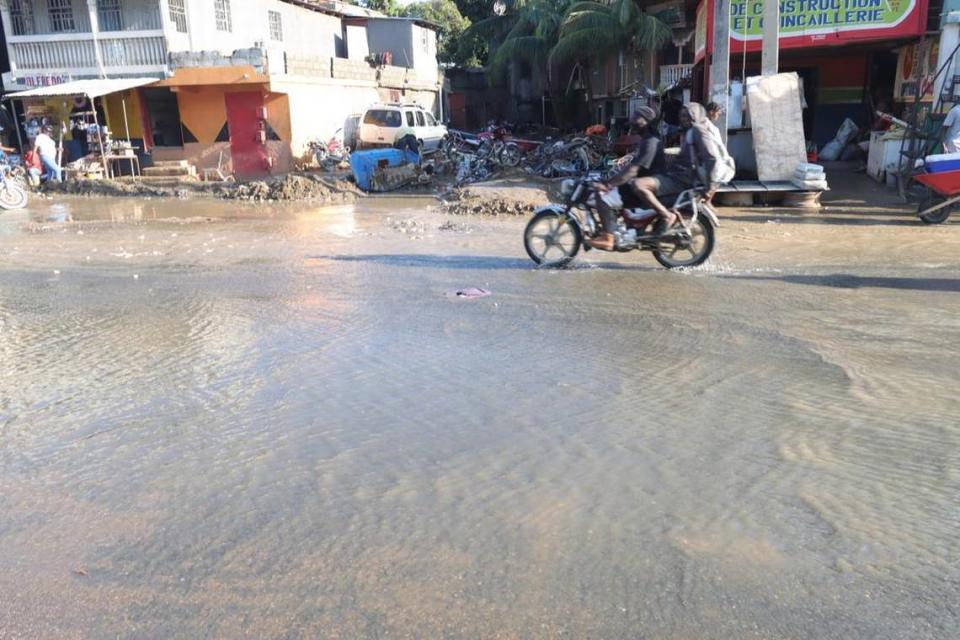The first days of Haiti’s rainy season continue to prove destructive and deadly for the country’s vulnerable population. The death toll from heavy rains has risen to 17, while the number of homes flooded has doubled to more than 4,000, the country’s Civil Protection authorities said.
Most of the destruction has occurred in the northern region of the country in Haiti’s second largest city, Cap-Haïtien, the office said in its most recent update on the weather-related disaster.
The report shows that in addition to the loss of lives, more than 4,910 homes have been flooded while at least 40 homes have been either been damaged or destroyed during the rains.
On Monday, the office warned Haitians to remain on alert because the soil remains saturated and rain and thunderstorms were expected in the West, Southeast, Northwest, Grand’Anse and Nippes regions of the country.
“Between April 28 and May 2, the country experienced two deadly events, particularly in the Northwest and North departments,” the agency said.
The heavy rains in late April had already led to a landslide in Port-de-Paix, which killed at least three people in the same family, including a six-year-old child, the agency said. Moderate to heavy rains days later on May 1 and 2 led to the deaths of 13 people in Cap-Haïtien, including 12 in a landslide.
“The city is very much in a critical situation as a result of the rains that continue,” Cap-Haïtien Mayor Yvrose Pierre said. “The city is impassable. Even where we used to get rid of the waste, we can’t because of the flooding the roads are blocked. There are roads that are practically impossible to get through.”

Pierre said Cap-Haïtien, affectionately known as Okap, needs support from the central government, which currently collects all of the revenues that come into the city, whether it’s the taxes from Royal Caribbean International’s port stop at Labadee or from the Hugo Chavez International Airport, which today has become the only way out of Haiti.
“When I talk about profound support, I am talking about the canals, the ravines that have not been drained for 10 years,” she said. “We need to not only remove people off the mountains, but we need to reforest the mountain to prevent the landslides.”
“I believe the city merits an emergency intervention,” she added.
Pierre said the mayor’s office, along with the local garbage collection agency, are in need of equipment. Their only truck for garbage collection isn’t working and the public works department lacks a budget for fuel.
“They need to give the mayor’s office the financial means,” she said about the central government in Port-au-Prince. “All of the money from the largest contributors is blocked in the capital and we need it to be distributed so the mayor’s office can do what needs to be done. I have spent seven years as mayor and it’s seven years that the money from the largest contributors have never come to Cap-Haïtien.


In December alone, Pierre said, the city contributed over $82 million to the country’s coffers “that went to Port-au-Prince. But while the city was flooded, there hasn’t been one cent that stayed in Okap to support Okap.”
Among the contributors to the city’s tax base is Royal Caribbean, which in March announced it will suspend ports of calls at Labadee, its private beach in Haiti, even though the area has not seen the kind of violence unfolding in Port-au-Prince.
Pierre said even though the cruise ship tourists didn’t come to the city itself, there are a lot of vendors who depend on cruises to earn a living.
“There is an impact,” she said, adding that this means there even less money going into to the public treasury.
On Monday, the United Nations said the armed violence in Port-au-Prince continues to affect the population , with more people fleeing the capital.
“The latest attacks in Delmas, in the metropolitan area of the capital Port-au-Prince, that took place on Friday forced thousands of people to flee violence,” said Stéphane Dujarric, spokesperson for U.N. Secretary-General Antonio Guterres.
Dujarric said the head of the U.N. Population Fund, Natalia Kanem, warned that the majority of those displaced are women and girls and are particularly at risk.
“Conditions in the displacement sites are deplorable, with women and girls at heightened risk of sexual exploitation and violence and with people struggling to secure food, clean water and the most basic commodities,” he said.
On Friday, Guterres asked the global community not to forget Haiti. Taking to X, formerly Twitter, he wrote “Hunger in Haiti has reached unprecedented levels. Almost half of the population are now facing acute food insecurity.”
The United Nations’ $674 million humanitarian response plan for the country, Guerres said, is only 15.2% funded.
Source Agencies


